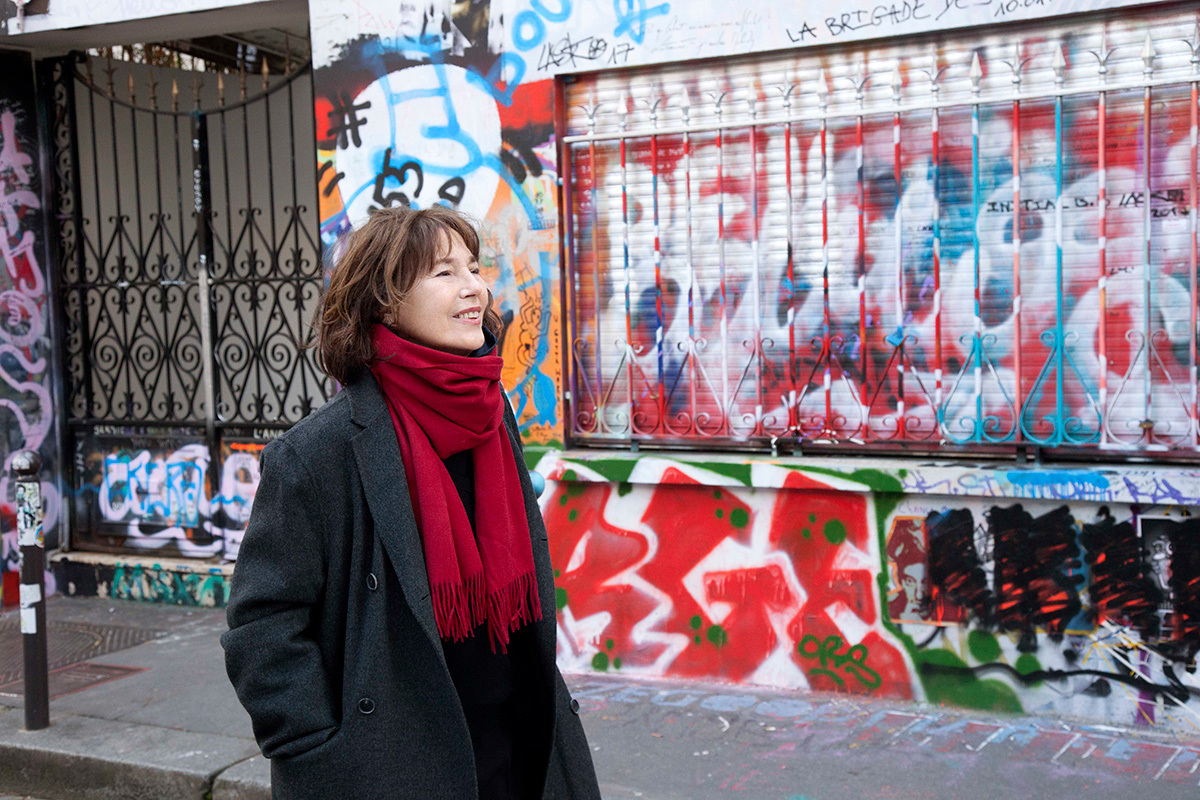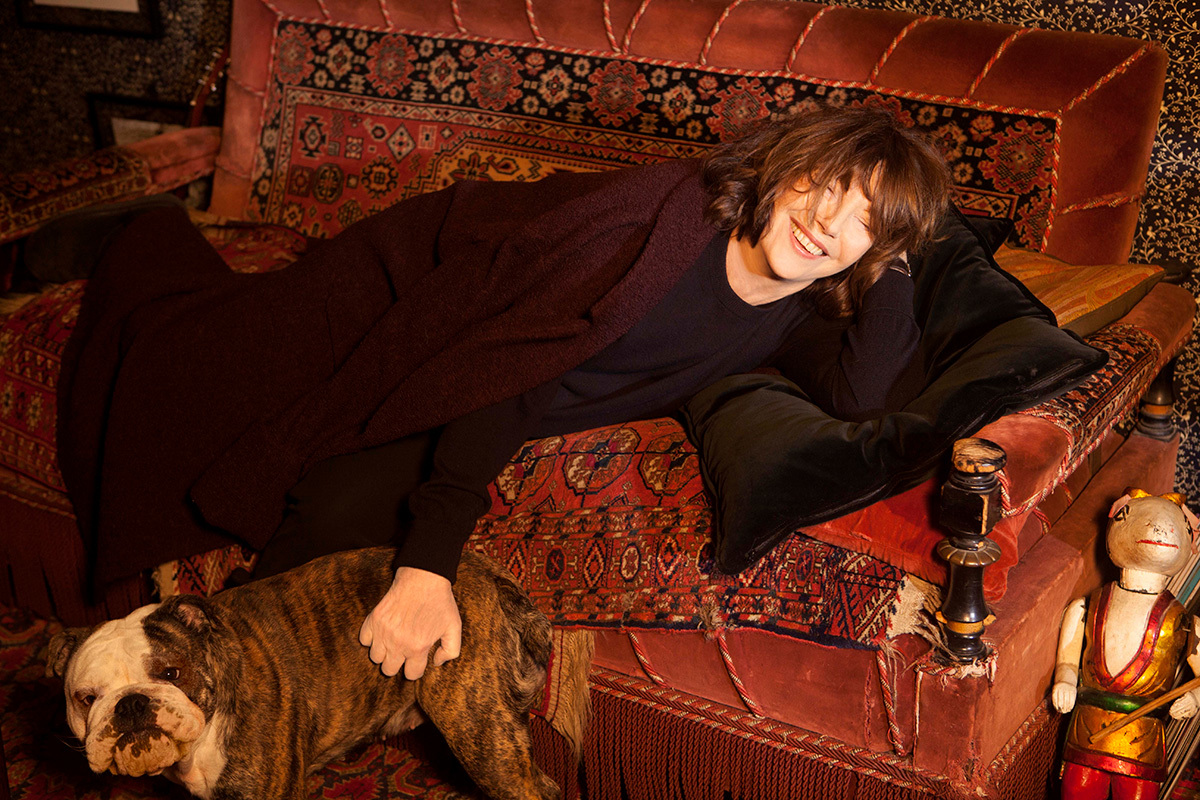He was France’s most controversial songwriter. She the British ingenue. And together, over a ten-year affair, Serge Gainsbourg and Jane Birkin would come to define the kind of glamourous, artist-meets-muse love that Paris is known for. A sort of jumping in the Seine love. A strolling down Boulevard Saint-Germain love. A recording multi-million selling songs that get you outlawed by the Vatican love. Now, some 37 years since they split, and 26 years since he died, they still enchant and enthrall; Birkin is releasing a new album of pieces written by the man described by former French president François Mitterrand as “our Baudelaire, our Apollinaire”, the musician who “elevated song to the level of art”.

“It’s the least one can do, to keep people alive in that way,” says Birkin today. “Serge was right when someone asked him, ‘What’s your idea of the end of the world?’ and he said, ‘My death’. I thought, ‘Oh, goodness me. Here he is taking himself for god’. But afterwards I thought, actually, it’s very truthful. Because that is the end of the world for this person. If going around the world talking about them makes them last a bit longer, well, it’s the least one can do.”
The song that reminds me of moving to Paris…
Françoise Hardy, Tous les garçons et les filles. I was living in Boulevard Lannes, in the same house as Edith Piaf and when she died there was an enormous queue on the pavement to see her, because that’s what the French do. I think Serge was there, amongst the others. But it meant that when I pushed my way through and showed my card to the policemen and was let through, the crowd whispered as one man, “C’est Françoise Hardy!”. I was so happy to be that distinguished singer that I shut my trap and said nothing, rather than let out the fact that I had a terrible English accent and wasn’t the lovely Françoise Hardy. That song, her way of singing, her way of being, her absolute beauty…. If I looked a tiny bit like her when I was 16 then lucky me.
The song that reminds me of meeting Serge…
It was a silly song called Yummy Yummy Yummy, the record of which I stuck between his toes when he was asleep after the most incredible night out. We started off at Regine’s, where I pulled him onto the dance floor, and everything that had been so unpleasant about him was suddenly frightfully attractive. He was shy; that’s very attractive. He was funny; that’s most attractive. And the fact that he couldn’t dance was just wonderful. After that he took me out to Rasputin’s nightclub, where they’re all Russian, and got them to play Sibelius’ Valse triste on the pavement as we got into the taxi. He stuck 50-franc notes into their violins saying, “ce sont des pute comme moi”. Then we bounded off to La Calvados, where it was South American music and old Joe Turner, the Jazz musician, was at the piano where Serge was playing four handers and I saw that he was brilliant. He could pick up any tune that people fired at him, of course, because he’d been a bar pianist. And then at about two in the morning we went to the strangest of nightclubs, called Madame Arthur, where all the men were dressed as ladies and Serge’s father had been the pianist. Everyone knew Serge since he was a tiny boy so it was all “Ooh, Serge” and kissing him on the head. I thought, wow, this really dangerous looking person is, in fact, loved by all. I couldn’t believe the carry on. Then we must have gone, I suppose, it wasn’t Pigalle because we didn’t do anything daring like Pigalle yet, but we did go to the market, where he gave champagne to the butchers, who all knew who he was. He said, “Do I drop you home?” and I said, “No”, feeling very bold indeed. Indeed very bold. So he took me off to the Hilton hotel where the lady behind the desk said, “Same room as usual, Mr Gainsbourg?”. And I thought, “No, no, no!”. In the lift I was thinking. “No, no, no! This is awful.” Then we got up to the room he fell asleep. That’s when I went off to the drug store, got Yummy Yummy Yummy, came back, put it between his toes and went back to the Hôtel Esméralda. It was the beginning of a wonderful, wonderful affair.
The first song I heard by Serge…
I suppose the first thing I heard of his was a song called Manon, which was with classical musicians because it was for a film with Catherine Deneuve called Manon 70. Then it was the very, very bold record he originally wrote for Brigitte Bardot, Je t’aime… moi non plus. He said to me, “Would you like to sing it?” and of course I said yes. First of all, prudently, he said he was going to write a song for me which was on the Prelude to Chopin, and I thought, “Ooh! How sweet! How flattering!”. Wrong. Je t’aime… moi non plus would take everyone by surprise. And it still does.
The song I most enjoyed creating with Serge…
As Je t’aime… moi non plus had caused such a stir, in England they decided to bring it out as an LP, under a plastic cover and Serge and I had to quickly sing another ten songs to go with it. One of the ones he wrote was 69 année érotique which goes without explaining. And he wrote me an album afterwards which was called Di doo dah, which was really sweet. It had a little line about how I slept with my felt monkey, which I did, and how I went to school hand in hand with my father who looked just like me. So, from then on, I was on French television every Saturday singing this rather sweet song. My parents tried to explain to their friends that I was really quite popular in France, it wasn’t just a sort of seedy song, but that never got to England. What did get to England was Lui Magazine, with me chained to a radiator. My mother said she could have done without that and I think she could have. At the time I remember feeling sort of very bolshy and saying, “Well, it was the Christmas issue, what did you want me to do, be dressed as Father Christmas?”.
The song I’m most proud of inspiring…
It’s a bit, sort of sad, but I think it’s one of his best songs… Les Dessous Chics. Which is really a mini portrait of Serge. Because he gave me his female side to sing, or his sad side. And as I left him, it was even more bizarre because from that day on we had no contract, there was no reason for him to write songs for me anymore, but he did. He wanted me to sing them. And what I had to sing were my faults. What I’d done to him. But I did sing them and was grateful that he still found a place for me in his artistic career. When I rang him up to say I’d had a baby girl, he said, “Oh, thank god, because I can’t see myself as godfather to a baby boy”. So he sort of fitted himself back in, in a way that I was never able to do with anybody that I knew. Now I think about it, it’s strange and I don’t know if it’s happened often in the history of songs. That someone goes on writing on until their dying day. Did he know that 26 years later I’d still be singing them? Did he know that they’d be portraits of him in a far more delicate way than his own songs for him? He would be imprudent on television, he would be burning 500-franc notes, he would be prancing like Squirrel Nutkin. And yet the fragile side still needed to show, and he could do it via me. So Les Dessous Chics is a song I really wanted to sing because he made me say, “One thing amongst other things that you don’t know is that you had the very best of me”. And then at the end it says, “I belonged to you, now I don’t belong to anybody, I don’t follow you anymore”. It was fairly cruel, but there’s a pleasure in singing it because it’s true. I really did have the very best of him.
Birkin/Gainsbourg: Le Symphonique is out now. A concert, Gainsbourg Symphonic with Jane Birkin, takes place at London’s Barbican on 26 September. Tickets are available here.
Credits
Text Matthew Whitehouse
Images © Carole Bellaiche
